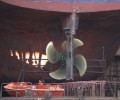Korean Shipbuilding Industry Achieves Successive Orders for LNG, Ammonia Transport Vessels

The domestic shipbuilding industry, which secured the top position in global orders last month, continues to receive new orders this month.
HD Korea Shipbuilding & Offshore announced on Nov. 14 that its subsidiary, HD Hyundai Heavy Industries, has recently signed a construction contract worth a total of 698.1 billion won (US$531.68 million) with a shipping company in the African region for two liquefied natural gas (LNG) carriers. The order amount per vessel is US$265 million, the same as the LNG carrier order amount received by HD Korea Shipbuilding & Offshore in August. Due to the increase in the exchange rate, however, the Korean won order amount has become larger, setting a new record for the highest historical price.
The ships ordered this time will be built at Ulsan HD Hyundai Heavy Industries and handed over to the shipowner by February 2028. With this contract, HD Korea Shipbuilding & Offshore has achieved 132.7 percent of its annual goal for this year, securing a total of 147 vessels, including one marine facility. The total order amount is US$20.89 billion, surpassing the annual target of US$15.74 billion as of the given date.
In addition, Hanwha Ocean also announced on the same day that it has received an order for four large ammonia carriers, equipped to use ammonia as fuel, from Greece’s Naftomar, a specialized shipping company for transporting LPG and ammonia worldwide. The total order amount is 656.2 billion won. These ships are scheduled to be constructed at the Geoje shipyard in South Gyeongsang Province and delivered to the shipowner in the first half of 2027.
This vessel is the largest among the ordered ammonia transport vessels globally so far, capable of transporting 93,000 cubic meters of ammonia. It will feature a shaft generator motor system that can save fuel by connecting a motor to the propulsion shaft and the Hanwha Ocean’s self-developed Smart Ship Platform HS4. Notably, there is also the possibility of transitioning to ammonia propulsion in the future, as desired by the shipowner.
Source: Business Korea
